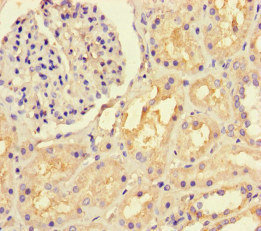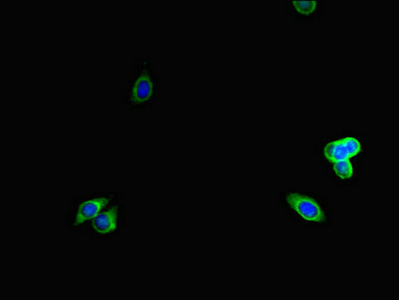LTBP4 Antibody
-
货号:CSB-PA02049A0Rb
-
规格:¥440
-
促销:
-
图片:
-
其他:
产品详情
-
产品名称:Rabbit anti-Homo sapiens (Human) LTBP4 Polyclonal antibody
-
Uniprot No.:Q8N2S1
-
基因名:LTBP4
-
别名:latent transforming growth factor beta binding protein 4 antibody; latent transforming growth factor beta binding protein 4L antibody; Latent-transforming growth factor beta-binding protein 4 antibody; LTBP 4 antibody; LTBP-4 antibody; LTBP4 antibody; LTBP4_HUMAN antibody; LTBP4L antibody; LTBP4S antibody
-
宿主:Rabbit
-
反应种属:Human
-
免疫原:Recombinant Human Latent-transforming growth factor beta-binding protein 4 protein (977-1180AA)
-
免疫原种属:Homo sapiens (Human)
-
标记方式:Non-conjugated
本页面中的产品,LTBP4 Antibody (CSB-PA02049A0Rb),的标记方式是Non-conjugated。对于LTBP4 Antibody,我们还提供其他标记。见下表:
-
克隆类型:Polyclonal
-
抗体亚型:IgG
-
纯化方式:>95%, Protein G purified
-
浓度:It differs from different batches. Please contact us to confirm it.
-
保存缓冲液:Preservative: 0.03% Proclin 300
Constituents: 50% Glycerol, 0.01M PBS, PH 7.4 -
产品提供形式:Liquid
-
应用范围:ELISA, IHC, IF
-
推荐稀释比:
Application Recommended Dilution IHC 1:20-1:200 IF 1:50-1:200 -
Protocols:
-
储存条件:Upon receipt, store at -20°C or -80°C. Avoid repeated freeze.
-
货期:Basically, we can dispatch the products out in 1-3 working days after receiving your orders. Delivery time maybe differs from different purchasing way or location, please kindly consult your local distributors for specific delivery time.
相关产品
靶点详情
-
功能:Key regulator of transforming growth factor beta (TGFB1, TGFB2 and TGFB3) that controls TGF-beta activation by maintaining it in a latent state during storage in extracellular space. Associates specifically via disulfide bonds with the Latency-associated peptide (LAP), which is the regulatory chain of TGF-beta, and regulates integrin-dependent activation of TGF-beta.
-
基因功能参考文献:
- DMD gene mutations involving the hinge 3 region, actin-binding domain, and exons 45-49, as well as the LTBP4 IAAM haplotype, were not associated with age of left ventricular dysfunction onset inDuchenne muscular dystrophy. PMID: 29766838
- High LTBP4 expression is associated with recurrence in glioblastoma. PMID: 27270107
- Studied the potential role of LTBP-4 in scleroderma through clinical, in vivo and in vitro studies. Results suggest that LTBP-4 protein level is increased in plasma and skin tissue of scleroderma patients; found LTBP-4 to be a potential biomarker to differentiate systemic scleroderma (SSc) from localized scleroderma (LSc) patients. PMID: 28263294
- The LTBP4 VTTT allele is associated with increased risk of dilated cardiomyopathy in European Americans. LTBP4 protein with the IAAM residues bound more latent TGFbeta compared to the LTBP4 VTTT protein. PMID: 26918958
- Our results show that LTBP4 interacts with TGFBR2 and stabilizes TGFbeta receptors by preventing their endocytosis and lysosomal degradation in a ligand-dependent and receptor kinase activity-dependent manner. PMID: 25882708
- We show that corticosteroid treatment and the IAAM haplotype of the LTBP4 gene are significantly associated with prolonged ambulation in patients with Duchenne muscular dystrophy PMID: 25476005
- In the mdx mouse model of Duchenne muscular dystrophy, the human LTBP4 transgene exacerbated muscular dystrophy symptoms and resulted in weaker muscles with an increased inflammatory infiltrate. PMID: 25338755
- In Caucasians with Duchenne muscular dystrophy and LTBP4 genotype there was a protective effect on age at loss of ambulation. PMID: 25641372
- It recruits elastin to microfibrils via fibulin-5. PMID: 25675815
- LTBP4 haplotype influences age at loss of ambulation, and should be considered in the management of Duchenne muscular dystrophy patients. PMID: 23440719
- Latent transforming growth factor beta-binding protein 4 is downregulated in esophageal cancer via promoter methylation. PMID: 23741501
- Data indicate mutations of FBLN4, FBLN5, and LTBP4 in 12 probands presenting with type 1 recessive cutis laxa. PMID: 22829427
- the G1 and G3 domains of versican were upregulated and LTBP-4 was downregulated in breast cancer stroma PMID: 21505857
- The lack of LTBP4-mediated targeting in malignant mammary tumor tissues may lead to a possible modification of TGF-ss1 and BMP bioavailability and function. PMID: 21468687
- Meta-analysis of abdominal aortic aneurysm size and growth rates demonstrated a significant association with the LTBP4 21011A>T genotype (a 2% decrease in AAA diameter, or a 0.53 mm/year reduction in AAA growth rate, per T allele [p=0.03, p=0.01]). PMID: 19897194
- These data suggest that LTBP-4 functions are modified by tissue-specific expression of the two N-terminally distinct variants, which in addition exhibit significant differences in cellular processing and targeting. PMID: 20175115
- Extracellular matrix is an important site of deposition for LTBP-3 and LTBP-4. PMID: 16157329
- Our findings suggest that variations in or near the HPN and LTBP4 genes do not play a role in the susceptibility to IA in the Dutch population. PMID: 18487557
- Novel functions for LTBP-4 as an adhesion molecule. PMID: 18585707
- Mutations in LTBP4 cause a syndrome of impaired pulmonary, gastrointestinal, genitourinary, musculoskeletal, and dermal development. PMID: 19836010
显示更多
收起更多
-
相关疾病:Urban-Rifkin-Davis syndrome (URDS); Duchenne muscular dystrophy (DMD)
-
亚细胞定位:Secreted, extracellular space, extracellular matrix.
-
蛋白家族:LTBP family
-
组织特异性:Highly expressed in heart, skeletal muscle, pancreas, uterus, and small intestine. Weakly expressed in placenta and lung.
-
数据库链接:
HGNC: 6717
OMIM: 310200
KEGG: hsa:8425
STRING: 9606.ENSP00000311905
UniGene: Hs.466766
Most popular with customers
-
-
YWHAB Recombinant Monoclonal Antibody
Applications: ELISA, WB, IF, FC
Species Reactivity: Human, Mouse, Rat
-
Phospho-YAP1 (S127) Recombinant Monoclonal Antibody
Applications: ELISA, WB, IHC
Species Reactivity: Human
-
-
-
-
-























